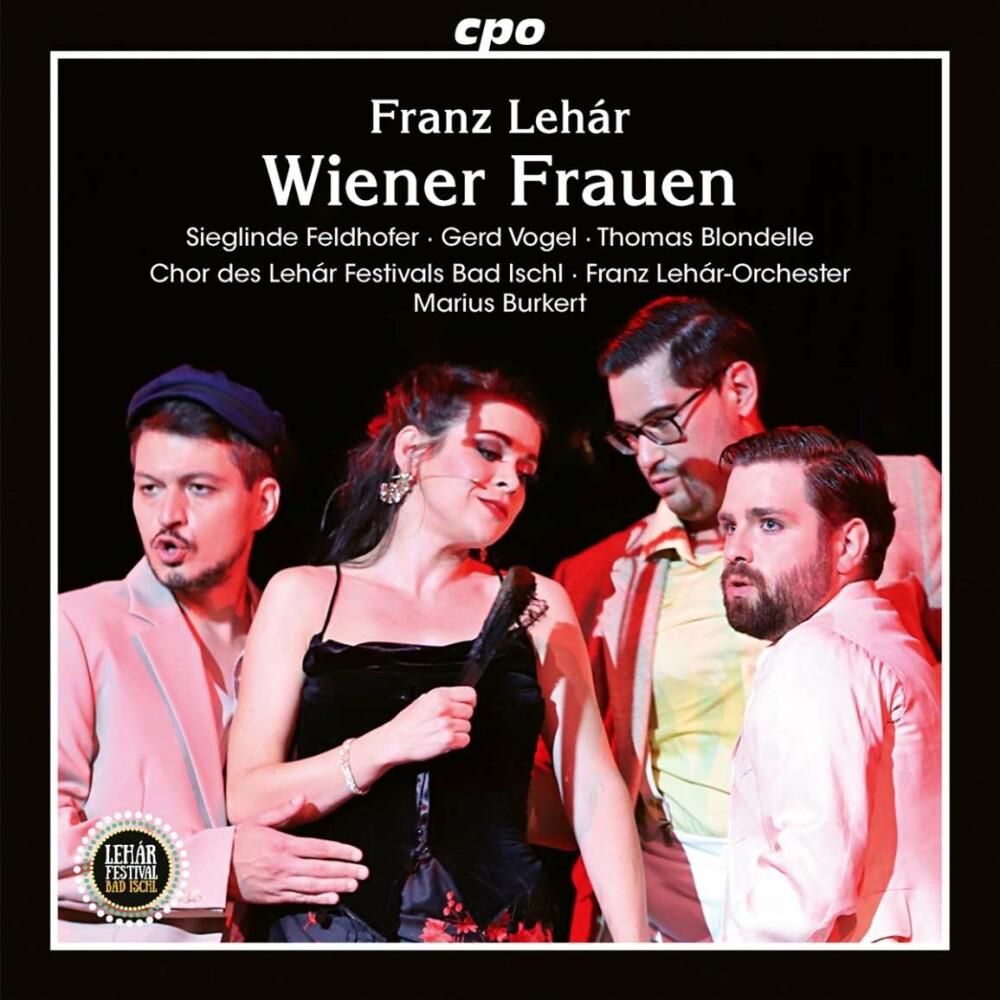Kevin Clarke
Operetta Research Center
27 October, 2023
So, here it is at last: Diana Damrau’s operetta album dedicated to the “life embracing side” of the genre and it’s “longing, happiness, comedy and revelry”. It’s a single disc with music by Robert Stolz, Franz Lehár, Emmerich Kálmán, Theo Mackeben and many others. Ernst Theis accompanies with the Münchner Rundfunkorchester, and Jonas Kaufmann is at hand for the duets, among them “Komm mit mir ins Chambre separée” from Heuberger’s Opernball.

Diana Damrau’s “Operette” album. (Photo: Erato)
The subtitle reads “Operette. Wien, Berlin, Paris”. And the album itself starts with “Du sollst der Kaiser meiner Seele sein”, a Stolz number that Lucia Popp also sings on her famous EMI operetta album conducted by Sir Neville Marriner.
Comparing the two voices, it’s immediately clear that Damrau lacks the emotional warmth Popp brought to such numbers, also to others that both include on their recitals, e.g. “Schlösser, die im Monde liegen” from Lincke’s Frau Luna or “Warum hast du mich wachgeküsst?” from Lehár’s Friederike.
Though Damrau started out in a similar repertoire as Popp, and with a somewhat similar soubrette voice, she has lost the easy delivery of her early years and sounds strained in anything that goes above the stave – the voice losing focus and becoming unpleasantly uneven. When she climbs all the way to the extreme top with some Gitta Alpár numbers (Dubarry and “In meinen weißen Armen” from Abraham’s Ball im Savoy) the voice doesn’t just sound uneven, it turns positively shrill.
On the other end of the spectrum, there are things like “Wär’ es auch nichts als ein Augenblick” from Lehár’s Eva. When you hear the almost Disney-like “fake” innocence Daumrau presents here and compare it with Lotte Lehmann singing this number, you become aware what is sadly lacking: any sense of drama or emotional involvement. Everything is light, chirpy, free of meaning. So don’t even start thinking of Elisabeth Schwarzkopf who also shares some of the titles of this abum and sings an overall more ravishing “Chambre separée”, without a duet partner.
The lack of depth might arise from the fact that Ernst Theis conducts everything – whether Johann Strauss, Benatzky, Abraham, Stolz and Lehár – as if these were Mantovani arrangements from the 1950s, but without the Mantovani magic. This is especially evident in the waltz “Mein Liebeslied muss ein Walzer sein” from Im weißen Rössl, with Kaufmann as a partner in crime.
The numbers that work best, for me, are those a little less familiar from other German soprano recitals (and that includes unfavorable comparisons with Ingeborg Hallstein albums). So I found “Ça fait tourner la tête” from Lopez’ Andalousie particularly enjoyable, even if the drunken laughter throughout is cringe inducing. Also “Rossignol, tout comme autrefois“ from Messager’s Monsieur Beaucaire can count as a specialty number. Or “Bien chapeautée“ from Christiné’s Phi-Phi.
Damrau’s diction throughout is crystal clear, which is great. But she doesn’t really have anything to say, which is not so great and which becomes very evident in the final track: “Ich bin eine Frau, die weiß, was sie will” from Oscar Straus’ operetta written for Fritzi Massary. If you’ve heard how Massary sings this (or Dagmar Manzel), you will wonder why an intelligent modern-day soprano such as Damrau can’t make more of these generous lyrics, especially since she starts so promisingly here.
If you’re looking for rarities, there’s a bouncy duet with Kaufmann from Korngold/Strauss’ Das Lied der Liebe (“Ein Kleiner Flirt”), there’s a Faschingsfee number (“Liebe, ich she’n mich nach dir”), and there’s the famous Rosen aus dem Süden waltz with text from Das Spitzentuch der Königin.
Damrau will go on tour with this program next year, there are concerts scheduled in Hamburg and Bremen, Essen and Baden Baden in the spring and early summer of 2024. Before that, Diana Damrau will debut as Rosalinde at Bayerische Staatsoper in December, a Fledermaus production staged by Barrie Kosky. What he can do with a singer with so little feeling for the subtext of the genre and with a voice in a somewhat questionable state remains to be seen.

Barrie Kosky, former artistic director of the Komische Oper Berlin. (Photo: Jan Windszus Photography)
It’s a coproduction with the Dutch National Opera, it will be transmitted live by Arte on tv. Vladimir Jurowski conducts. And, no, Jonas Kaufmann is not part of the cast list. But maybe he’ll show up as a surprise guest in act 2 – with Andrey Nemzer as Orlowsky.
If you are searching for glorious soprano operetta albums, then you might want to stick to the tried and tested ones by Popp and Schwarzkopf, even to Hallstein’s various offerings or Joan Sutherland, who has much better top notes and a more lavish way of singing the Eva waltz. (But Lotte Lehmann still remains first choice, I’d say.)
Damrau’s singing is – by far – better than what you get on cpo recordings from Ischl (e.g. the new Wiener Frauen). But since she’s offering numbers here that have been recorded by so many legendary predecessors, it’s a little worrying that she couldn’t find time to prepare better and make this music truly unique – as “her” interpretation, not just another run-of-the-mill version. Is that asking to much of an operetta singer in 2023? (Perhaps Ernst Theis is not the best conductor to make such miracles happen.)

Lehár’s “Wiener Frauen” from the Ischl Festival. (Photo: cpo)
If I sound disappointed with this album that’s because I remember Damrau as a young singer of enormous promise with such charm à la Erika Köth in her voice. It’s sad to realize that those days are gone. And instead of approaching operetta intelligently – because one doesn’t need a perfect voice to make maximum impact with the genre – this is nothing more than an attempt to create an easy selling album with easy listening music. Nothing wrong with that, in principle, but you’d think that after so much “revival” time for all sorts of things, we wouldn’t get “the very worst” of 1950s and 60s (and 70s) recycled. Again!
For more information and track details, click here.
